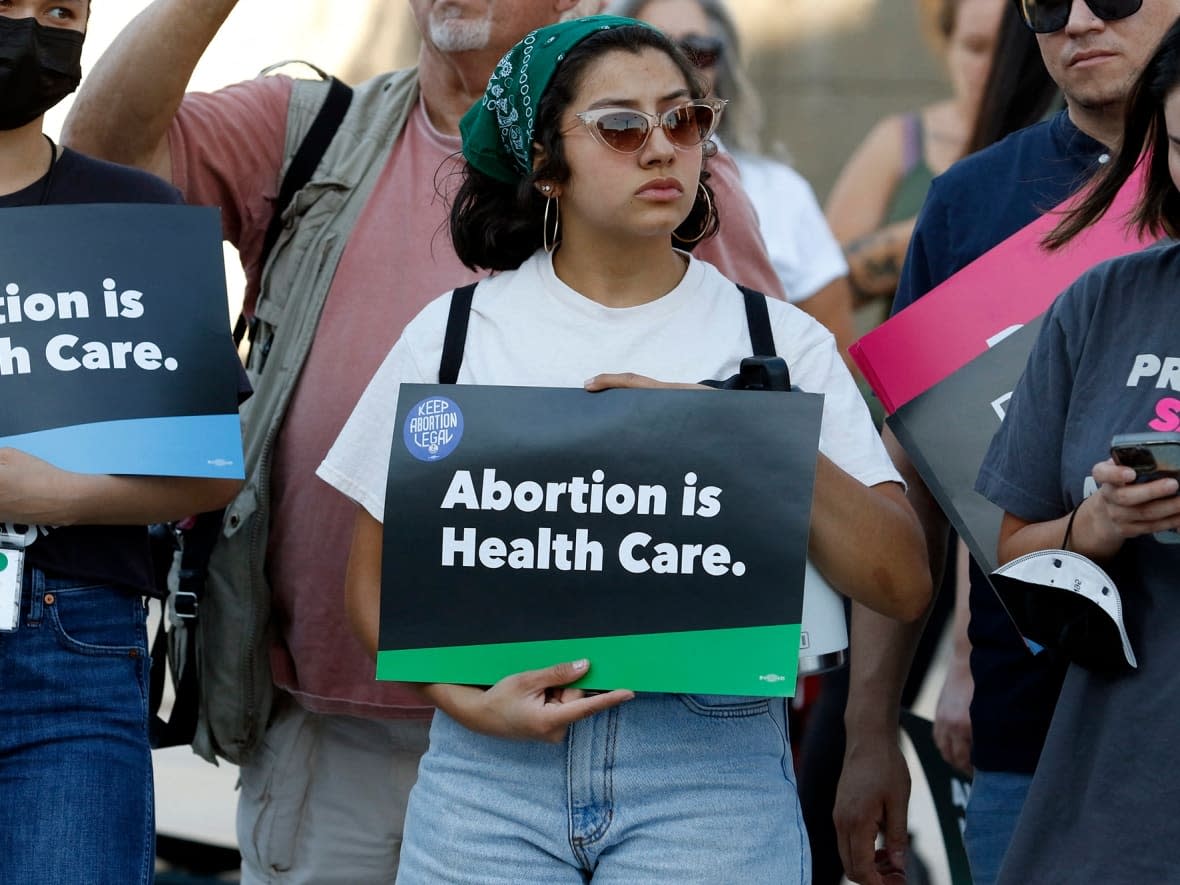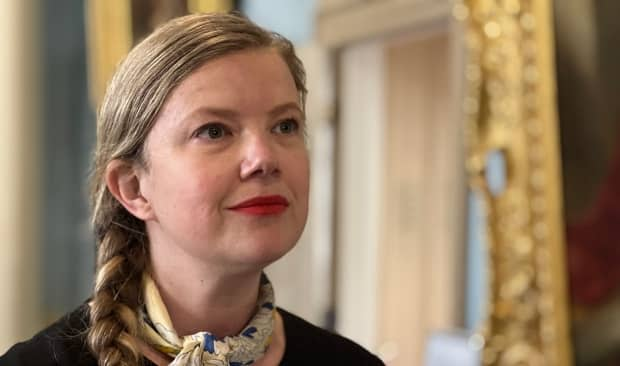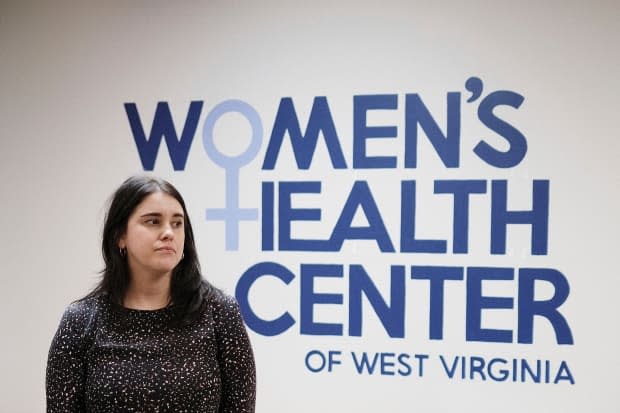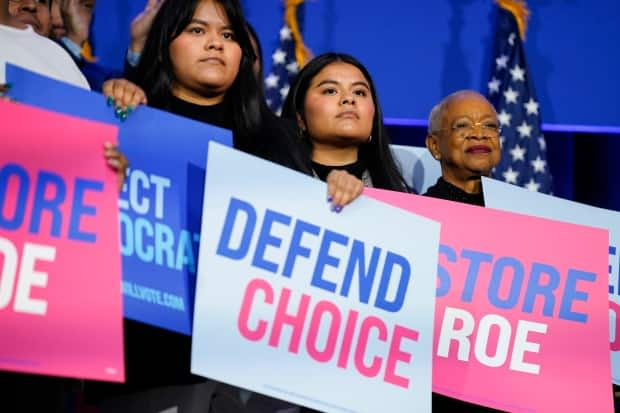Why don't we call more abortion clinics 'abortion clinics'? Language matters, advocates say

Women's Clinic. Choice in Health Clinic. Woman's Health Options.
What do these clinics have in common? They all offer abortion services, although it may not be obvious from the names, and advocates say the names themselves may exclude some of those who need help.
But now, there's a movement within abortion care to be more mindful of the language they use — whether that's to be more inclusive, or drop the euphemisms and be more forthright.
"I think it's very important to be very clear about what we're doing," said Martha Paynter, an assistant professor in the faculty of nursing at the University of New Brunswick and author of Abortion to Abolition: Reproductive Health and Justice in Canada.
"We have allowed the anti-choice movement to dominate a lot of our language and our conversations about what abortion is. And it's really necessary and timely for those of us who work in this care to be doing education about the facts, and support the public to come along in their understanding."
The Abortion Rights Coalition of Canada lists 76 clinics in Canada (both in communities and within hospitals) that perform abortions, although it doesn't include every single hospital that offers them. Of those clinics, only four — three in Ontario and one in Quebec — had "abortion" or "pregnancy termination" in the name.
There were many variations on "women's health," and some that mentioned "wellness," and "choices," but very few names actually make clear the medical procedure being offered.

A history of stigma
In a 2021 online guide, the American Civil Liberties Union (ACLU) called for more "abortion-forward language," or in other words, calling abortion "abortion," as opposed to using euphemisms like "women's health care" or "reproductive choice."
"Using euphemisms for the word abortion gives opposition control over the narrative," the ACLU noted.
This call is also reflected in the #SayAbortion hashtag, which was a 2019 campaign by Planned Parenthood and still used by advocates today.
So why don't we just say "abortion clinic?" Part of it is abortion's fraught history. Many of Canada's abortion clinics were established just after 1988, when the Supreme Court decided in R. vs. Morgentaler that a law that criminalized abortion was unconstitutional, Paynter explained.
There were three non-fatal attacks on abortion providers in Winnipeg, Vancouver and Hamilton in the 1990s. In 1992, Dr. Henry Morgentaler's Toronto clinic was firebombed. In the U.S., abortion clinics became targets for violent extremists, and some doctors who provided abortions were attacked and killed in their homes.
"There was still a lot of stigma as well as safety concerns about offering abortion care," said Jill Doctoroff, the executive director of National Abortion Federation Canada.
Doctoroff says there's also an issue of confidentiality. She used to work in a clinic that didn't have abortion in its name, and that clinic would sometimes need to provide medical notes as a requirement for a patient's work or school. Not having "abortion" in the clinic name would protect their privacy, she said, noting the same was true for referrals.
But today, people are becoming more accepting of the term abortion, especially in Canada, Paynter said.
"In response to the fall of Roe [v. Wade] in the U.S., there's definitely been a very proud and grateful response from the Canadian public to our regulatory regime, where abortion is completely decriminalized in this country and there are no limitations on that through criminal law," she said.
"The clinics haven't quite caught up with the shift in public attitudes toward the word abortion."
The problem with 'women's' clinics, and 'choices'
Still, once a clinic name has been established in a community, it can be difficult to make a change, explained Joyce Arthur, the executive director for the Abortion Rights Coalition of Canada. It can also be quite costly, she added.
"Some clinics may be operating on a tight budget and don't have the money to spend on a big name change," Arthur said.
That doesn't mean it's not happening, but so far it's not to add "abortion" — it's to take out "women." Two clinics in Vancouver recently dropped "women" from their titles: the Willow Clinic (formerly Willow Women's Clinic) and the Elizabeth Bagshaw Clinic (formerly the Elizabeth Bagshaw Women's Clinic).
And in December, Health P.E.I. announced it had changed the name of the Women's Wellness and Sexual Health Services to Sexual Health, Options & Reproductive Services (SHORS), noting the new name more accurately reflects the population it serves in a more inclusive manner.

"The language we use in health care is important," said Andrew MacDougall, Health P.E.I.'s executive director for community health and seniors care, in a news release. "If you're trying to access the services of a program like this and find the name doesn't include you, it can be real a barrier to receiving care."
Anastasia Preston, Trans Community Outreach Coordinator for PEERS Alliance, noted that the change will help to allow people of all gender identities to access needed health care.
This is part of a trend in abortion care across the country recognizing that not everyone who can get pregnant identifies as a woman, Paynter said. About one in 300 Canadians age 15 and over identify as transgender or non-binary, according to the 2021 census.
In its online statement on language, the National Abortion Federation Canada notes "we embrace and respect each individual's gender identity, expression, and experience." This includes an effort to use gender-inclusive language, such as pregnant person, pregnant people, they, them, and patient.
Doctoroff says the organization has offered sessions on inclusive language as well as inclusive care, and said they've had a really positive uptake.

A number of clinics and abortion supports in Canada also use the term "choice," which is another word some advocates take issue with despite its past popularity.
"Certainly, back in the '90s, when the clinics were opening, 'pro-choice' was the catch phrase," Arthur said.
Paynter says the word's usage is misleading, and the idea that it's a choice is almost flippant.
Some studies have shown that those who seek and are denied abortions can endure long-term health consequences, are more likely to experience poverty and unemployment, have higher levels of anxiety, are more likely to stay in abusive relationships, and that their children fare worse than their peers.
"It isn't like you're choosing between equal options," Paynter said. "It's our individual social, economic, structural circumstances that drive our decisions. And while abortion is a decision, it really doesn't feel like a choice to most people who are receiving one."

Arthur also notes that a number of anti-abortion groups, or crisis pregnancy centres, have adopted the use of "choice" in their language. For instance, the "Woman's Choice" clinic in Charleston, W. Va., is designed to steer women facing an unwanted pregnancy away from choosing an abortion, the Associated Press reports.
People will also often refer to "a woman's right to choose," Arthur said.
"Please, let's retire that phrase," she said, noting that a better term would be "reproductive rights."
'A tough line to walk'
Our language choices are important because they help shape public perception and education, Paynter said. For instance, the moniker "surgical abortion," is also misleading, she said, since a first-trimester abortion is a seven-minute procedure with no cutting involved.
"If we educated people about what it really involved, there would be less fear and less stigma."
WATCH | Why the focus has turned to abortion pills:
At the same time, renaming all the clinics "abortion clinics" wouldn't encompass all the services many of these facilities offer, she said, such as trans care, fertility work ups, and pap smears. And now that primary-care physicians can prescribe abortion medication, it's important for abortion clinics to diversify.
Doctoroff noted the language changes aren't always simple for clinics, as they attempt to balance confidentiality and safety while not contributing to the stigma.
"It's a tough line to walk for many facilities."


